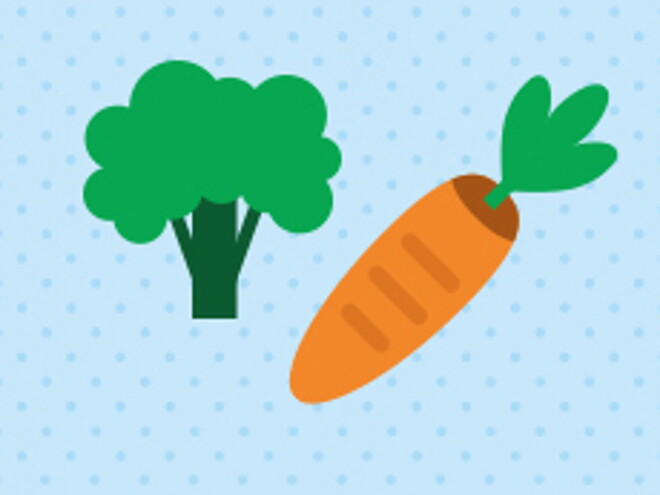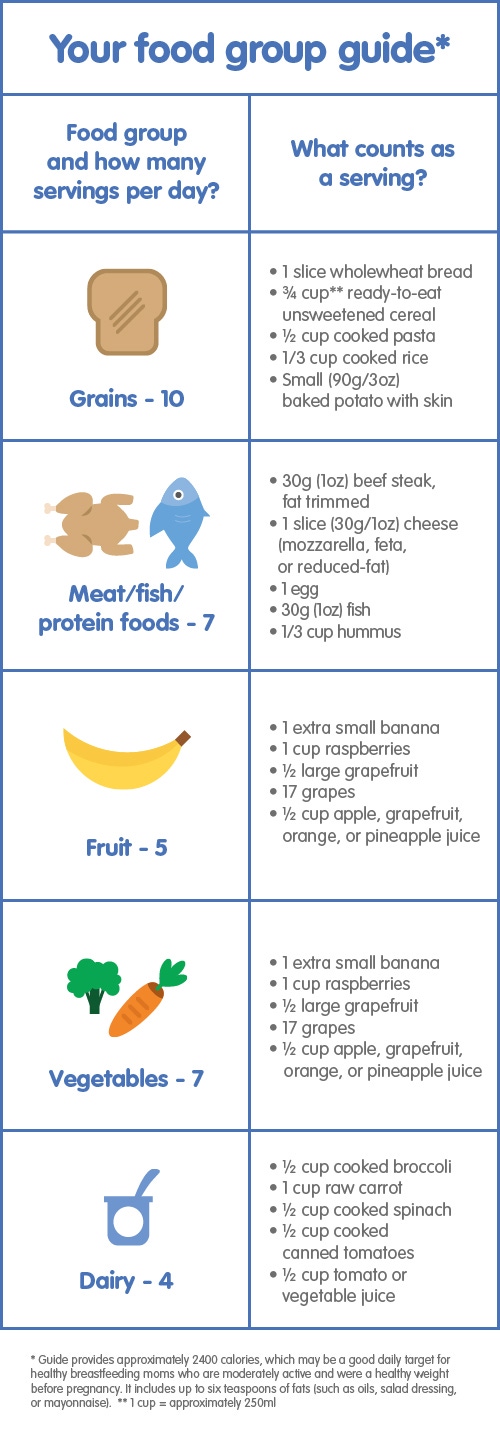
When you’re breastfeeding it’s important to consume a balanced diet by eating appropriate amounts of foods from each of the main food groups. This will make sure you’re both getting the wide variety of nutrients you need to stay healthy. Eating well during this time not only supports your baby’s healthy development, it also nourishes your body while it does the incredible job of making breast milk.

Top 9 milk-changing nutrients
Scientific studies have shown that, among the variety of vitamins and minerals you both need, there are nine key nutrients that can influence the quality of your breast milk. Eating foods containing these nine nutrients can increase their concentrations in your breast milk – great news for your growing baby!
- Vitamin B1 (Thiamin)
- Vitamin B2 (Riboflavin)
- Vitamin B6
- Vitamin B12
- Vitamin A
- Vitamin D
- Iodine
- Selenium
- DHA (Docosahexaenoic acid)

Put your eating habits to the test
1. Did you eat 10 servings of grains yesterday?
(For example, 1 serving = 1 slice wholewheat bread, 1/3 cup cooked rice, or ¾ cup ready-to-eat unsweetened cereal)
[YES] Congratulations! You’ve eaten the recommended amount of foods containing important nutrients, including fiber, iron, and magnesium.
Foods from the Grains Group also contain essential B vitamins (B1, B2, B3, and folic acid) and selenium. Three of these nutrients (B1, B2, and selenium) can influence the quality of your breast milk. B vitamins help your baby’s heart, brain, blood, sight, and nervous system develop healthily. They also help your baby grow and develop. Selenium is important for the healthy development of your baby’s brain and nervous system.
[NO] You could do better! If you haven’t come close to the recommended 10 servings of foods from the Grains Group, you’ve missed out on important nutrients, including fiber, iron, and magnesium.
You could also be lacking in essential B vitamins (B1, B2, B3, and folic acid) and selenium. Three of these nutrients (B1, B2, and selenium) can influence the quality of your breast milk. B vitamins help your baby’s heart, brain, blood, sight, and nervous system develop healthily. They also help your baby grow and develop. Selenium is important for the healthy development of your baby’s brain and nervous system. Increase the amount of foods from the Grains Group you eat today then take the test again tomorrow!
2. Did you eat 7 servings of meat/fish/protein foods yesterday?
(For example, 1 serving = 30g (1oz) meat, fish, or poultry or 1 egg)
[YES] Congratulations! You’ve hit the target for the recommended number of servings from the meat/fish/protein foods group. You’ve nourished your hard-working breastfeeding body with much-needed protein, iron, zinc, magnesium, and vitamin E.
You’ve also consumed important B vitamins (B1, B2, B6, and B12), and, if you’ve eaten fatty fish (such as tuna, mackerel, and salmon), you’ll have consumed vitamin D and DHA too. This means your baby will be drinking breast milk rich in nutrients that help the development of his brain, bones, heart, nervous system, eyesight, and blood. Your high-quality breast milk will also support his healthy growth.
[NO] You could do better! If you haven’t come close to the recommended seven servings of food from this group, your hard-working breastfeeding body is missing out on important nutrients including protein, iron, zinc, magnesium, and vitamin E.
You’ve also missed important B vitamins (B1, B2, B6, and B12), which may mean your breast milk is lacking in nutrients that help the development of your baby’s brain, bones, heart, nervous system, eyesight, and blood. If you haven’t eaten any fatty fish (such as tuna, mackerel, and salmon), you’re unlikely to be getting enough vitamin D or DHA. Put foods containing protein (meat, poultry, fish, dry beans and peas, eggs, nuts, and seeds) on your shopping list today then take the test again tomorrow!
3. Did you eat 5 servings of fruits yesterday?
(For example, 1 serving = 1 extra small banana, 1 cup raspberries, or 17 grapes)
[YES] Congratulations! You’ve eaten the recommended amount of fruit to help keep you and your baby healthy. Fruit contains important nutrients including potassium, vitamin C, folic acid, and fiber.
If you’ve eaten fruits such as cantaloupe, apricots, mango, and papaya, you’ll have also consumed vitamin A. Eating more foods containing vitamin A can increase the amount in your breast milk. Vitamin A is a key nutrient for helping your baby’s vision, immune system, and healthy skin develop.
[NO] Oops! If you haven’t eaten any fruit you’re missing out on important nutrients including potassium, vitamin C, folic acid, and fiber.
Fruits such as cantaloupe, apricots, mango, and papaya also contain vitamin A. Eating more foods containing vitamin A can increase the amount in your breast milk. Vitamin A helps the healthy development of your baby’s eyesight, immune system, and skin. Make sure you eat five servings of fruit today and check back tomorrow to see if you can answer yes to all five questions in the quiz!
4. Did you eat 7 servings of vegetables yesterday?
(For example, 1 serving = ½ cup cooked vegetables such as broccoli, ½ cup cooked canned tomatoes, or 1 cup raw vegetables, such as carrot)
[YES] Congratulations! You ate the recommended amount of vegetables for breastfeeding moms yesterday. That means you’ve consumed potassium, vitamin C, folic acid, and fiber – all important nutrients for your health and to keep those energy levels up.
Eaten leafy green vegetables such as cabbage and spinach? Then you’ve had vitamin A, one of the top nine nutrients that can influence the quality of your breast milk. That means your baby is enjoying milk rich in a vitamin that helps his eyesight, immune system, and skin develop healthily.
[NO] Not quite there! If you ate fewer than seven servings of vegetables yesterday, you probably didn’t get enough potassium, vitamin C, folic acid, or fiber – all important nutrients for your health and to keep those energy levels up.
Eaten leafy green vegetables such as cabbage and spinach? Then you’ve had vitamin A, one of the top nine nutrients that can influence the quality of your breast milk. That means your baby is enjoying milk rich in a vitamin that helps his eyesight, immune system, and skin develop healthily.
Serve up some extra vegetables with your meals today, or enjoy some as a snack, to make sure you hit the target of seven servings. Retake the quiz tomorrow and you’ll be able to confidently click YES!
5. Did you eat 4 servings of dairy yesterday?
(For example, 1 serving = 1 cup milk or ¾ cup plain yogurt)
[YES] Congratulations! You ate the recommended amount of dairy products for healthy, breastfeeding moms. That means you’ve consumed protein, calcium, and potassium. These nutrients will help support the health of your bones and teeth.
Some dairy products also contain vitamin D and iodine, two of the nine nutrients that affect the nutritional balance of your breast milk. Vitamin D is essential for your baby’s bone development. Iodine will help your baby’s nervous system and brain develop healthily.
[NO] Keep trying! If you didn’t manage the recommended four servings of dairy, you’ll have consumed some (but possibly not enough) protein, calcium, and potassium. These nutrients help support the health of your bones and teeth.
Some dairy products also contain vitamin D and iodine, two of the nine nutrients that affect the nutritional balance of your breast milk. Vitamin D is essential for your baby’s bone development. Iodine will help your baby’s nervous system and brain develop healthily. Think about ways you can consume more dairy today to hit the four servings target. A yogurt after a meal, a drink of milk and some cheese will help you on your way.
[OVERALL RESULTS]
Congratulations, you’ve finished the quiz and learned more about how many servings you need to eat from each food group (and why) when you’re breastfeeding! How many of the five questions did you click YES for?
5
Well done! Keep up the good work every day to give your body the nutrients it needs to stay healthy and make nutritious breast milk for your little one.
3-4
You could improve! You’re eating the recommended number of servings from some food groups but missing out on others. Make a note of where you need to improve and include more foods from those groups in your diet.
0-2
Oops! Your diet isn’t as balanced or nutrient-rich as it could be because you’re not eating enough food from all five groups. Make a note of where you need to improve and include more foods from those groups in your diet. Your body needs these nutrients to stay healthy and make nutritious breast milk for your little one.
Sources
Allen LH. B vitamins in breast milk: relative importance of maternal status and intake, and effects on infant status and function. Adv Nutr 2012; 3(3):362-9.
American Academy of Pediatrics Policy Statement. Breastfeeding and the use of human milk. Pediatrics 2012; 129:e827–41.
James DC, Lessen R. Position of the American Dietetic Association: Promoting and supporting breastfeeding. J Am Diet Assoc. 2009; 109(11):1926-42.
Kolasa KM, Firnhaber G, Haven K. Diet for a healthy lactating woman. Clin Obstet Gynecol 2015; 58(4):893-901.